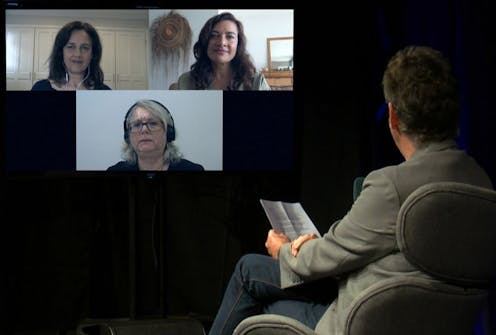Live-streamed events: watch top thinkers explore how the dramatic upheavals of 2020 have changed our world
- Written by Molly Glassey, Digital Editor, The Conversation

In January 2020, Australia went from battling one of its worst bushfire seasons ever to preparing for COVID-19 to hit its shores. What ensued was crisis: a pandemic, political upheaval, a biodiversity crisis, an international human rights movement, global recession and localised emergencies dwarfed by a world spinning on an axis of turmoil.
In a series of live events, leading thinkers and contributors to The Conversation examine perhaps the most significant and punishing year of the 21st century so far. Watch them below.
Borders and the pandemic
Watch Stan Grant (journalist and Vice Chancellor’s Chair of Australian-Indigenous Belonging at Charles Sturt University), Hugh White (Emeritus Professor of Strategic Studies at ANU) and Dennis Altman (Professorial Fellow in Human Security at La Trobe University) in a wide-ranging discussion about how the pandemic has changed our world: from China/America power shifts to Black Lives Matter; from the future of universities to tower blocks and inequality.
Chaired by Paul Barclay, presenter of ABC Radio National’s Big Ideas.
Presented in partnership with The Bob Hawke Prime Ministerial Centre, UniSA.
Cook revisited
Captain James Cook arrived in the Pacific 250 years ago. Over the years, retellings of his voyage aboard the Endeavour have compressed history into a palatable whitewashed narrative for mainstream Australia. Watch Professor Kate Darian-Smith, Associate Professor Kate Fullagar and researcher and filmmaker Alison Page, a descendant of the Walbanga and Wadi Wadi people of the Yuin nation, as they revisit Cook’s arrival. Bringing fresh perspectives to Cook’s journey through the Pacific and his interactions with Indigenous peoples, our panellists reveal and reflect on the perspectives of our shared history.
Chaired by Paul Barclay, ABC Radio National Big Ideas.
Presented in partnership with the State Library of Queensland. You can find all The Conversation’s Cook 250 coverage here.
#BlackLivesMatter in the Asia Pacific
For West Papuans in Indonesia and Indigenous Australians who live within systemic racism and oppression, #BlackLivesMatter resonated deeply. Join Elvira Rumkabu, lecturer of international relations at Cenderawasih University, and Eddie Synot, a Wamba Wamba First Nations person and the Centre Manager of the Indigenous Law Centre at UNSW, to learn how racism and discrimination continues in Indonesia and Australia and how this global movement should force us all to confront past and current injustices.
Chaired by Prodita Sabirini, Editor at The Conversation Indonesia.
Crisis and denial
What do climate deniers, anti-vaccination activists and COVID-19 conspiracy theorists have in common? Why are they so resistant to “facts”? Watch research psychologist and former politician Carmen Lawrence, social scientist Julie Leask and cognitive scientist Stephan Lewandowsky as they explore why myths and misinformation can be so compelling, who benefits from spreading misinformation, and how we can change people’s minds.
Chaired by Misha Ketchell, Editor of The Conversation.
Presented in partnership with The Bob Hawke Prime Ministerial Centre, UniSA.
From the ashes: Australia re-imagined
Last summer’s bushfires left Australia profoundly changed. Lives and homes were lost; almost 13 million hectares of bush was incinerated. Food and fuel systems broke down, and even city-dwellers choked on toxic smoke. From this tumult and devastation, what new vision will emerge? How have the fires forced us to rethink ourselves, our communities and our relationships with nature?
Watch social scientist Petra Buergelt, animal ecologist Dale Nimmo and planning expert Barbara Norman – whose family lost a home in the fires – as they explore what will rise from the ashes in the months and years ahead.
Chaired by Nicole Hasham, Environment + Energy Editor at The Conversation.
Presented in partnership with National Library of Australia. Find all The Conversation’s bushfire recovery coverage here.
The domino effect: climate change and pandemics
The COVID-19 crisis is deeply connected to the climate and biodiversity crises. All animals harbour viruses and other pathogens, and when environmental pressures force them into contact with humans, the results can be catastrophic. Environmental damage can also make humans more susceptible to the effects of infectious diseases.
Governments have demonstrated they can take immediate, radical emergency measures, which go beyond purely economic concerns, to protect the wellbeing of all. And yet, despite widespread acknowledgement that climate change and other environmental effects of the pursuit of economic growth are a global emergency, the world has largely failed to address them.
Watch infectious disease and environmental health experts Dr. Jean-François Guégan (Director of Research at IRD, France), Fiona Armstrong (Executive Director and Founder of Climate and Health Alliance (CAHA)) and Dr Natasha Chassagne (Adjunct Research Fellow, Swinburne University, Centre for Social Impact) as they discuss why, for humans to survive, it is critical to connect human health, civilisation and the natural systems on which we depend.
Chaired by Misha Ketchell, Editor of The Conversation.
Presented in partnership with The Bob Hawke Prime Ministerial Centre UniSA and The Embassy of France in Australia, as part of the French Australian Conversations (FAC) series.
Authors: Molly Glassey, Digital Editor, The Conversation




